Understanding Medicaid Waiver Programs and Their Role in Family Caregiving
Medicaid waiver programs are pivotal in enabling family caregivers to provide quality care at home, fostering independence, reducing institutionalization, and supporting the well-being of both caregivers and care recipients. This article explores how these programs work, their development, and their significance in the evolving landscape of healthcare support.
What Are Medicaid Waivers and Their Significance for States
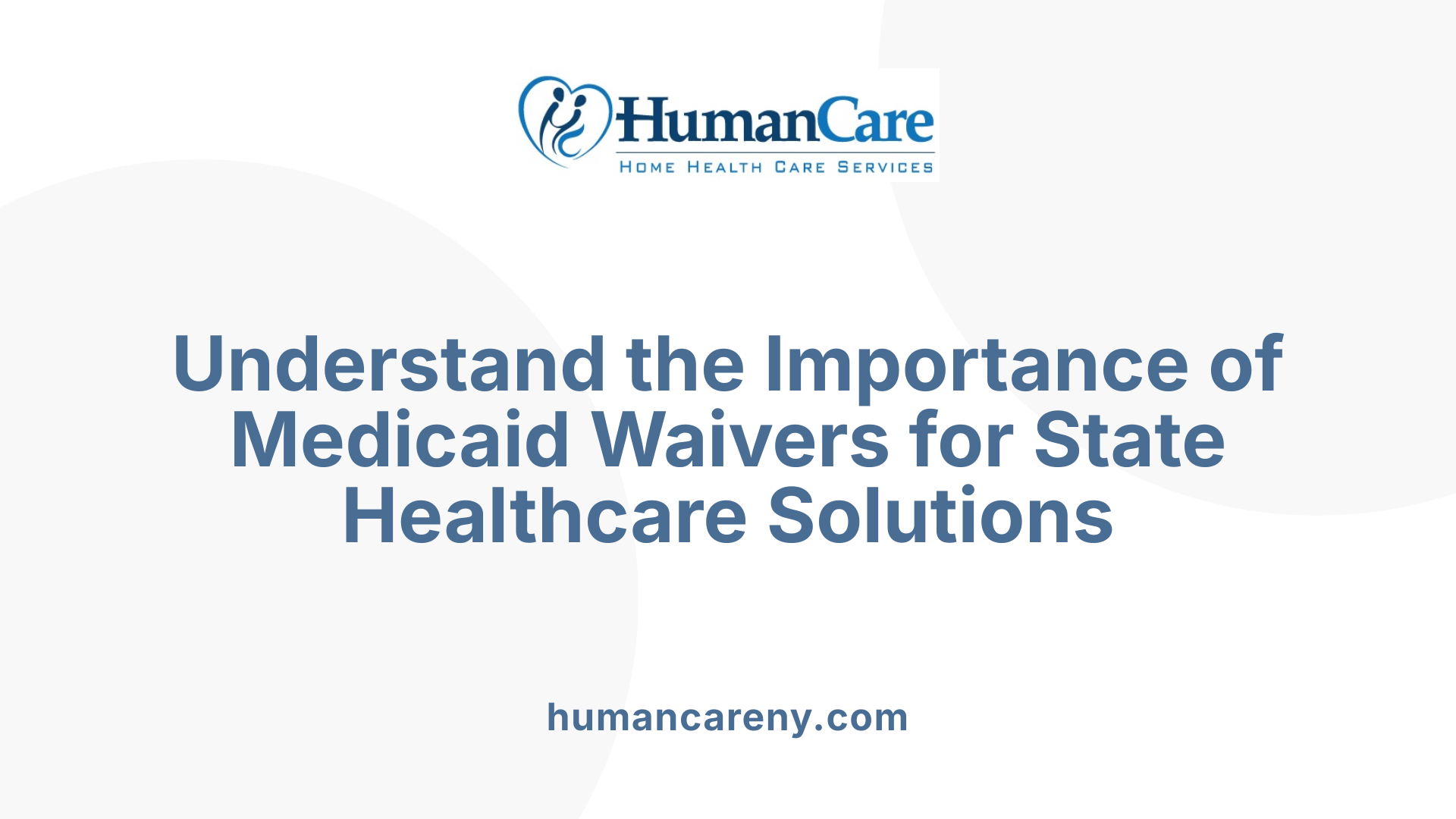
What are Medicaid waivers and why are they important for states?
Medicaid waivers are special authorizations granted by the federal government that allow states to modify their Medicaid programs beyond standard federal rules. This flexibility enables states to develop innovative and customized healthcare solutions suited to their unique populations and needs.
There are different types of Medicaid waivers, such as Section 1115, 1915(b), and 1915(c), each designed for specific purposes. For example, Section 1115 waivers generally support demonstration projects to test new approaches, while 1915(c) waivers focus on expanding home and community-based services.
Approval for these waivers is discretionary, requiring states to submit detailed applications that demonstrate how their proposals meet budget neutrality and other federal requirements. Ongoing evaluations ensure that the programs meet their intended goals.
These waivers are vital for states because they allow for tailored health care delivery models that can improve access, quality, and cost efficiency. By leveraging waiver programs, states can address local challenges such as provider shortages, cultural barriers, or emergency responses, leading to better health outcomes and more sustainable Medicaid spending.
Supporting Family Caregivers through Medicaid Home Care Programs
Medicaid home care programs offer a variety of support services that are designed to assist family caregivers in their vital roles. These include training programs that help caregivers learn essential skills for providing effective care, as well as counseling and support groups that offer emotional resilience and peer connection. Respite care is another critical service provided by Medicaid, allowing family caregivers to take needed breaks by arranging professional temporary care for their loved ones. This not only relieves stress but also helps prevent burnout.
In addition to support services, many Medicaid programs enable self-directed care options. This approach gives enrollees, including family members, the authority to select, train, and manage their caregivers. In some cases, family caregivers can be directly paid for their services, especially in states with waiver programs supporting individuals with disabilities or aging adults. Payments to legally responsible relatives are permitted under certain circumstances, providing financial recognition for their caregiving efforts.
Supporting family caregivers through these programs can significantly enhance the quality of care provided. By offering training and emotional support, Medicaid helps caregivers perform their responsibilities more effectively. Financial supports, such as caregiver payments and respite services, promote long-term sustainability, enabling families to maintain independence and avoid unnecessary institutional placement. Ultimately, Medicaid’s comprehensive approach recognizes the critical role of family caregivers and provides essential resources to sustain them.
How Medicaid Waivers Facilitate Payments to Family Caregivers
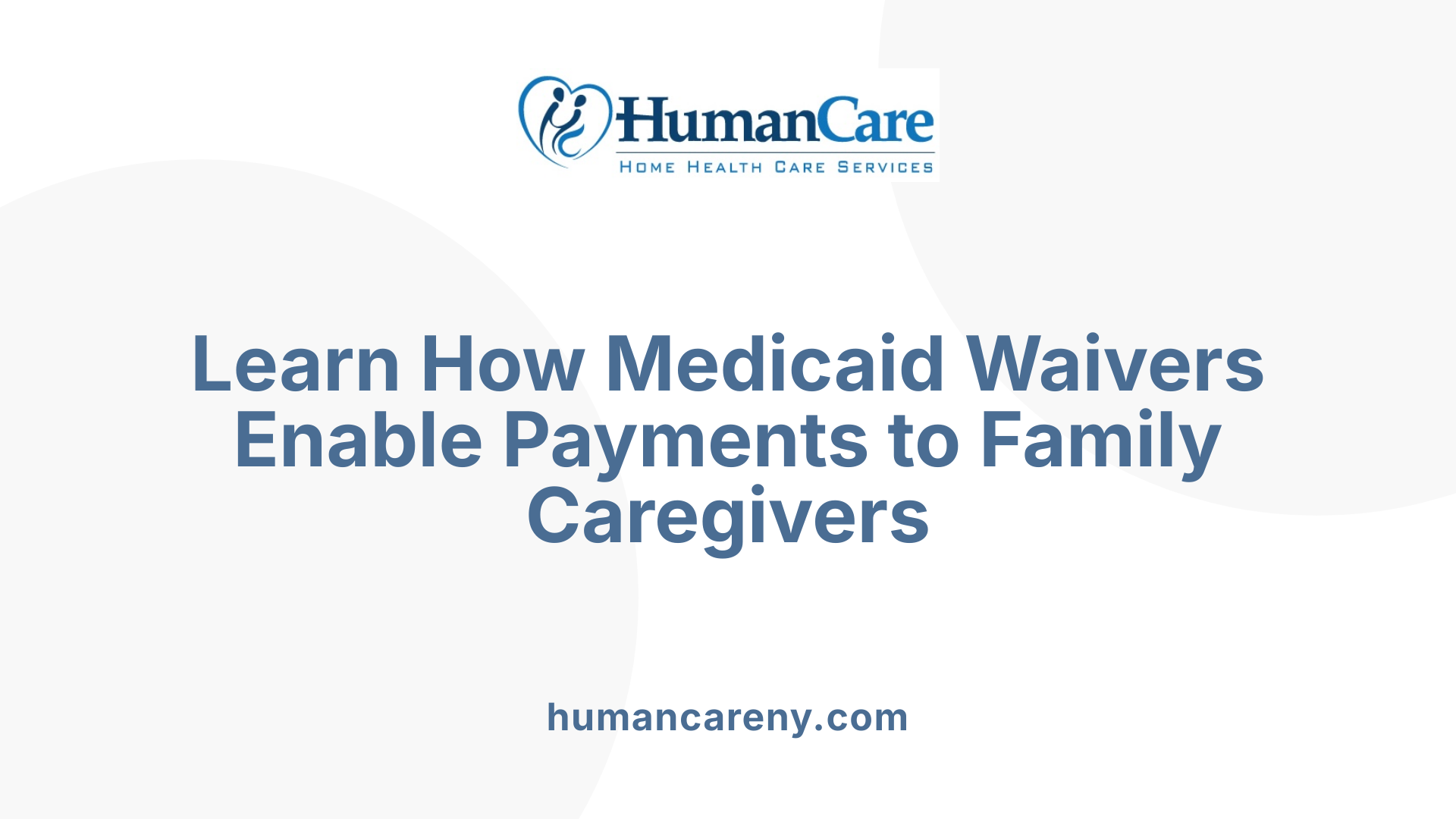 Medicaid waiver programs serve as vital tools that enable payments to family caregivers, especially within self-directed care models. These waivers, often under authorities like 1915(c) and 1115, grant states the flexibility to tailor services that meet individual needs, including the ability to compensate family members for caregiving tasks. In programs supporting individuals with intellectual or developmental disabilities, Medicaid often permits enrollees or their authorized representatives to select, train, and dismiss caregivers, which includes family members. Such arrangements allow relatives to be paid for providing personal care, health-related activities, and other support services.
Medicaid waiver programs serve as vital tools that enable payments to family caregivers, especially within self-directed care models. These waivers, often under authorities like 1915(c) and 1115, grant states the flexibility to tailor services that meet individual needs, including the ability to compensate family members for caregiving tasks. In programs supporting individuals with intellectual or developmental disabilities, Medicaid often permits enrollees or their authorized representatives to select, train, and dismiss caregivers, which includes family members. Such arrangements allow relatives to be paid for providing personal care, health-related activities, and other support services.
Self-direction is a prominent feature of these programs, giving care recipients or their families significant control over their care. Enrollees can act as employers, hiring family members directly and managing their schedules and duties. Many states have structured family caregiving programs that include stipends, per diem payments, or hourly wages, providing financial support to those who supply essential daily care.
State examples illustrate how policies vary. For instance, Pennsylvania’s Community HealthChoices and California’s IHSS program allow family members to be paid as personal care providers. While eligibility criteria differ, most require that the caregiver is a family member, lives with the recipient, and is approved through background checks and training requirements. Funding for these payments typically comes from Medicaid waivers, which cover costs for services such as personal support, respite, transportation, and home modifications.
The impact of these waiver arrangements extends beyond financial support. They help reduce family caregivers’ physical, emotional, and financial burdens. By enabling family members to be recognized as paid caregivers, Medicaid programs promote community-based care, delay institutionalization, and improve overall care quality. Moreover, during emergencies like the COVID-19 pandemic, flexibility around caregiver payments and services was expanded to ensure continued support.
In summary, Medicaid waivers play a crucial role in facilitating paid family caregiving. They provide the legal and financial pathways for family members to be recognized as paid providers, strengthen the capacity for in-home care, and support a more sustainable and personalized approach to long-term care.
Impact of Medicaid Aging Waivers on Informal Caregiving
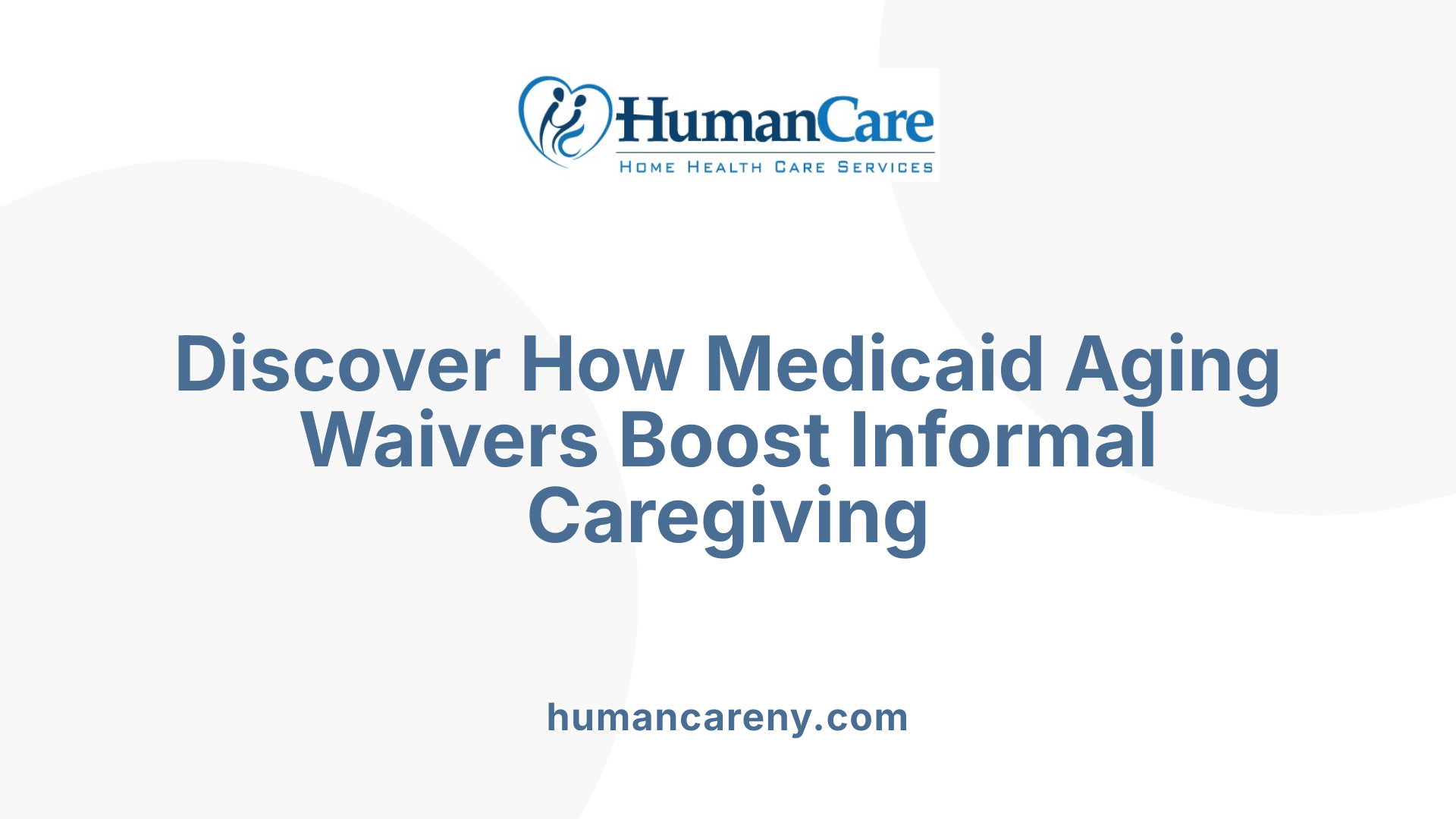 Medicaid waivers play a significant role in shaping the landscape of informal caregiving within the United States. Supporting family members as primary caregivers, these programs enable relatives, especially adult children and spouses, to provide essential care in home settings.
Medicaid waivers play a significant role in shaping the landscape of informal caregiving within the United States. Supporting family members as primary caregivers, these programs enable relatives, especially adult children and spouses, to provide essential care in home settings.
Research has demonstrated that increased expenditure on Medicaid aging waivers directly correlates with higher participation rates among family caregivers. Specifically, a 10 percent rise in Medicaid aging waiver spending can boost the likelihood of an adult child assuming a caregiving role for a parent by about 0.1 percentage points, or approximately 0.3 percent overall. This relatively small but meaningful increase suggests that enhanced funding and benefits encourage more family members to step into caregiving roles, helping to sustain in-home care and reduce the reliance on institutional services.
This shift has important implications. Firstly, it supports family caregivers by providing training, respite services, and financial compensation, which can alleviate the physical, emotional, and financial burdens often associated with caregiving. Secondly, increased caregiver participation helps delay or prevent nursing home placements, leading to better health outcomes and preserving the dignity of care recipients.
Furthermore, as more states adopt self-directed and family-inclusive waiver programs, the scope of informal caregiving expands. This approach not only enhances the availability of family caregivers but also fosters a sense of empowerment and recognition for their vital contributions. As a result, Medicaid's strategic investments in these waivers promote a more resilient and responsive support system for aging populations.
In summary, Medicaid aging waivers significantly influence the prevalence and support of informal caregivers. Increased expenditures translate into more family members engaging in care, which can enhance the quality of life for seniors and provide economic benefits by reducing long-term institutional costs.
Benefits of Medicaid Waiver Programs for Family Caregivers
What are the benefits of Medicaid waiver programs for family caregivers?
Medicaid waiver programs provide vital support to family caregivers, ensuring they can offer effective, sustainable care at home. One of the main benefits is access to training, which helps caregivers develop the skills needed to manage complex health and daily living tasks, boosting their confidence and reducing anxiety.
Respite care is another critical service offered through these programs. It provides temporary relief by arranging professional care for loved ones, allowing caregivers to rest, attend to their personal needs, or handle other responsibilities. This temporary break is essential for preventing burnout and maintaining caregivers' emotional well-being.
Financial support is also a highlight of Medicaid waivers. Many states allow caregivers to be paid or reimbursed for their services, especially when caregiving involves personal assistance or supervision. This financial reimbursement can contribute to economic stability for caregivers, many of whom may reduce work hours or stop working altogether to provide care.
Supporting family caregivers through these programs has broader impacts. It helps delay the need for institutional care, keeps individuals in their familiar home environments, and enhances overall quality of life. By empowering family caregivers with resources and recognition, Medicaid waivers strengthen the foundation of community-based caregiving, ultimately benefiting society by reducing healthcare costs and improving health outcomes.
Development, Implementation, and Policy Framework of Medicaid Family Caregiver Support
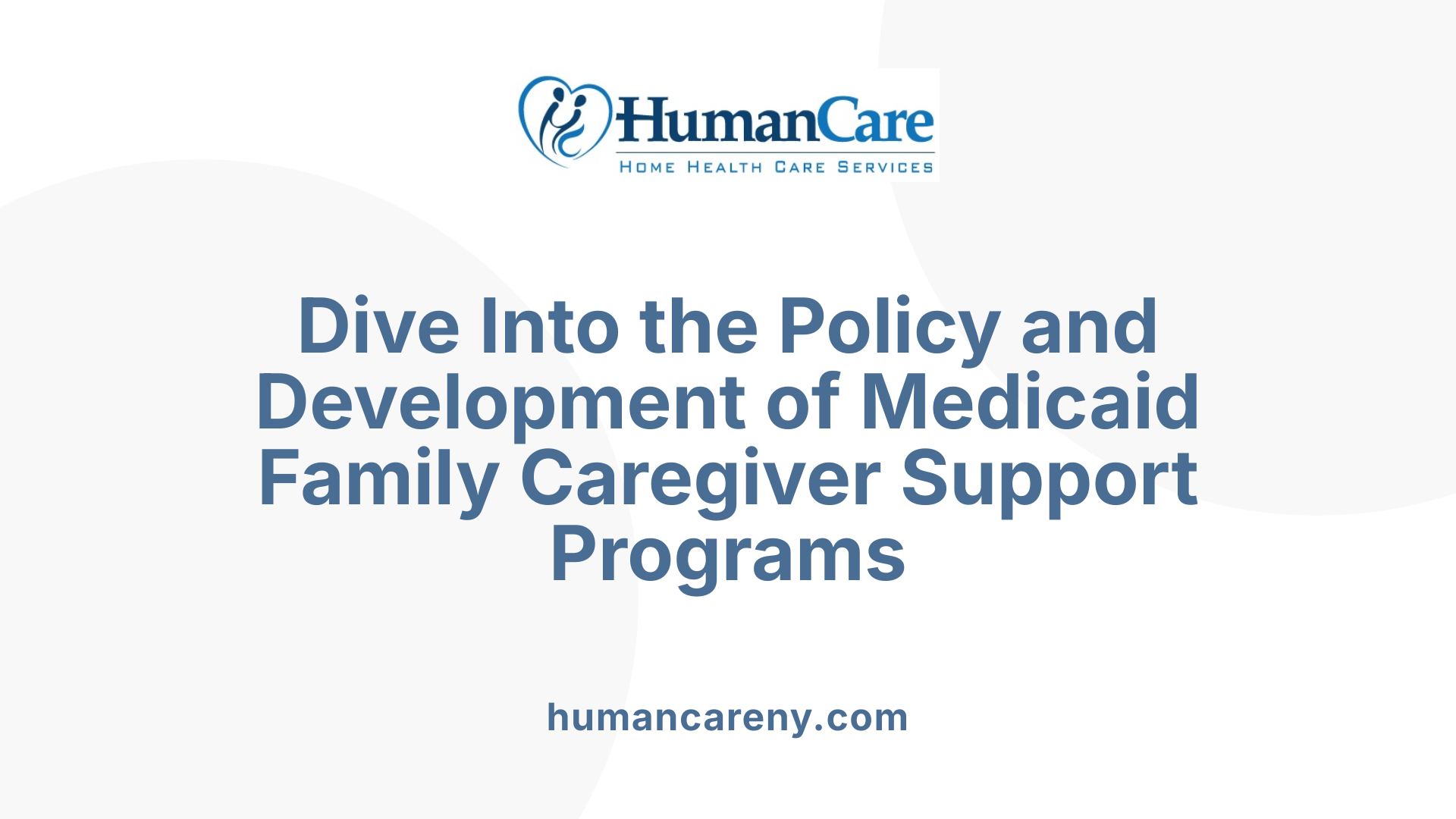 Medicaid waiver programs supporting family caregivers are the result of targeted policy initiatives at both state and federal levels. These programs are designed to empower families to participate actively in providing care through a variety of services, including training, respite, and financial compensation. Federal authorities such as sections 1915(c), 1915(i), 1915(j), and 1915(k) of the Social Security Act provide the legal framework that allows states to customize services and incorporate family caregivers into their long-term care strategies.
Medicaid waiver programs supporting family caregivers are the result of targeted policy initiatives at both state and federal levels. These programs are designed to empower families to participate actively in providing care through a variety of services, including training, respite, and financial compensation. Federal authorities such as sections 1915(c), 1915(i), 1915(j), and 1915(k) of the Social Security Act provide the legal framework that allows states to customize services and incorporate family caregivers into their long-term care strategies.
In practice, implementing these programs involves thoughtful design considerations. States must develop eligibility criteria that recognize the diverse needs of caregivers and care recipients. This includes establishing criteria for income, functional status, and relationship to the care recipient. Effective workforce training is also essential to prepare caregivers and care coordinators to deliver quality support. Additionally, states must set up systems to monitor for fraud and abuse and ensure culturally competent outreach to underserved populations, including racial and ethnic minorities and rural communities.
Policy innovations such as self-directed care and paid family leave are integral to these efforts. Self-direction allows recipients or their families to select, train, and directly manage caregivers, including relatives, providing greater flexibility and personalization of care. Some programs also explore paid family leave options, allowing family members to take compensated time off to provide necessary support.
Monitoring and evaluation are crucial for continuous improvement. Data collection on caregiver demographics, contributions, and needs informs policymakers about the efficacy of programs and the gaps that require attention. Regular caregiver assessments and outcome measurements help ensure that services remain responsive and effective.
Looking ahead, federal and state policymakers are encouraged to expand evidence-based practices, support innovative funding mechanisms, and promote integrated care models. The goal is to recognize family caregivers as vital contributors to the healthcare system, ensuring they receive adequate support while maintaining the sustainability and equity of long-term services.
Overall, the development and implementation of these programs reflect a commitment to strengthening community-based care and enhancing the well-being of both caregivers and care recipients, with the overarching aim of reducing reliance on institutional care and promoting independence.
Supporting the Future of Medicaid Waiver Programs for Family Caregiving
How are Medicaid waiver programs supporting the future of family caregiving?
Medicaid waiver programs play a crucial role in shaping the future landscape of family caregiving by offering extensive support that adapts to evolving needs. These programs are increasingly incorporating innovative solutions such as telehealth and remote monitoring, which enable caregivers to provide more effective and accessible care from a distance. For example, telehealth allows real-time consultation with healthcare professionals without the need for travel, while remote monitoring devices help track health metrics, alerting caregivers to potential issues early.
Advocacy and research are integral to advancing these programs. Stakeholders, including family caregivers, healthcare providers, and policymakers, advocate for expanded legislative support such as paid family leave, caregiver tax credits, and broader access to self-directed care options. Ongoing research into caregiver experiences and program outcomes helps identify gaps and opportunities, leading to enhancements that make caregiving more sustainable and less burdensome.
Federal initiatives are focused on simplifying application processes and increasing program capacity through technological innovations. These efforts aim to make access easier for families, ensure equity, and build culturally competent services that respect diverse populations. Incorporating caregiver feedback into policy development and program design ensures that services remain relevant and effective.
Overall, these strategic efforts strengthen Medicaid's ability to support family caregivers. By expanding technological tools, advocating for supportive policies, and continuously researching caregiver needs, Medicaid waiver programs are ensuring a resilient foundation for caregiving that can adapt to future challenges. This integrated approach aims to sustain high-quality, personalized care for individuals with disabilities or chronic conditions while supporting the vital roles of family caregivers—today and into the future.
Case Studies and Examples of Medicaid Waivers Supporting Caregivers
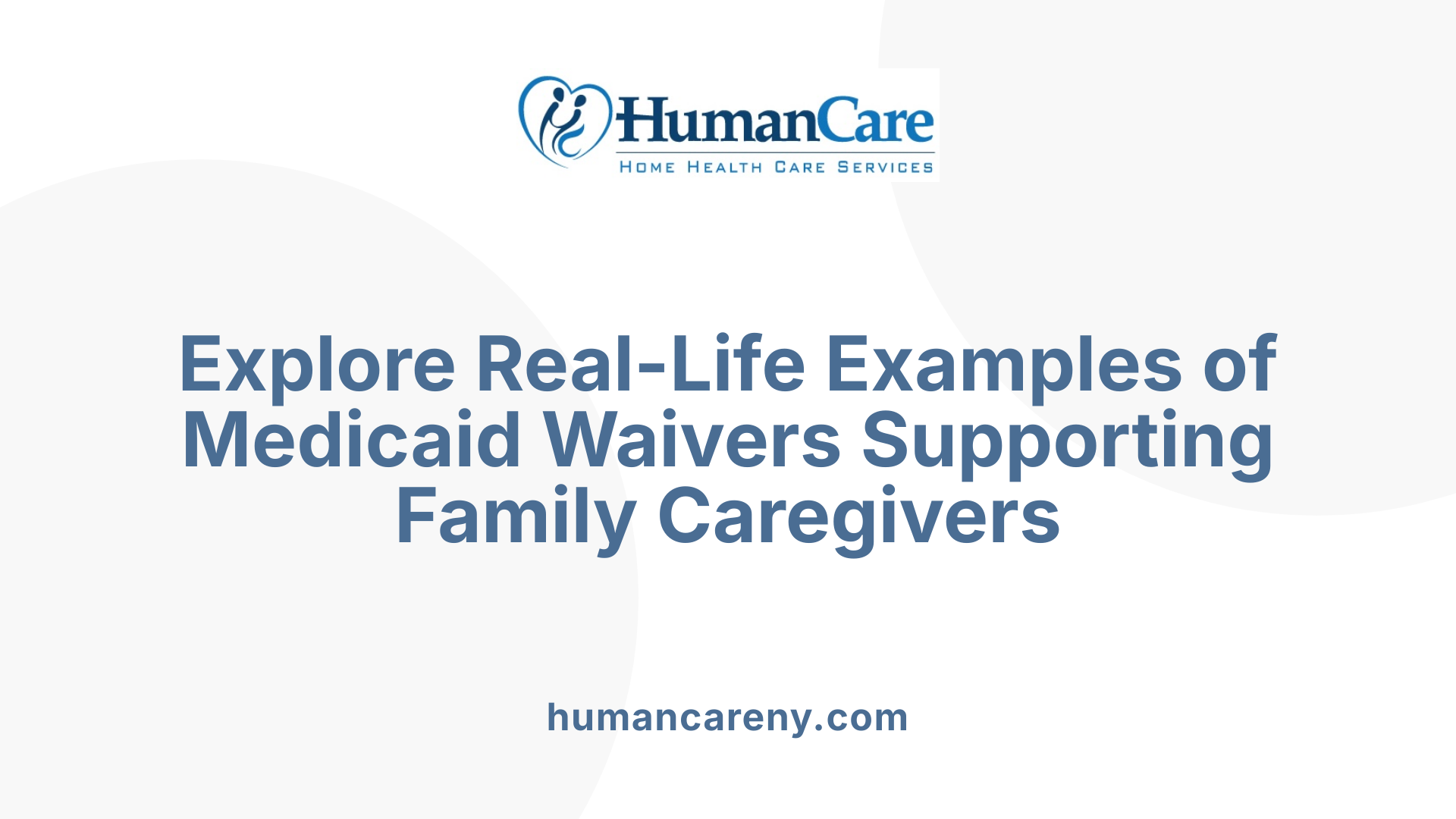
Indiana's Medicaid waiver highlighting care at home
Indiana’s Medicaid waiver programs are designed to support individuals requiring long-term care to remain in their homes instead of moving to nursing facilities. These programs cover services such as care planning, help with housework, adult daycare, transportation, behavioral support, medical equipment, therapy, and respite care. A unique feature is the participant-directed care option, which allows enrollees to select, train, and even pay family members or friends as caregivers. While these waivers do not provide direct payments to family caregivers, they help financially by covering services that would otherwise be paid out-of-pocket, thus reducing the financial burden on families.
Pennsylvania’s caregiver payment programs
In Pennsylvania, Medicaid Waivers and the broader Community HealthChoices (CHC) program permit family members to serve as paid personal care providers. This means that if a family member helps with activities like bathing, dressing, or medication management, they could receive compensation through Medicaid. Eligibility requires that the care recipient is enrolled in Medicaid and needs assistance with daily living activities. These programs provide vital financial support, respite services, and additional resources, helping families care for loved ones at home while reducing reliance on institutional care.
Georgia’s supported living services
Georgia’s Medicaid system offers various waivers, such as the All Programs Waiver, the Comprehensive Supports Waiver (COMP), and the New Options Waiver (NOW), aimed at supporting independence for individuals with disabilities or elderly populations. These programs cover services like personal support, homemaker services, and community-based assistance, facilitating living arrangements outside of institutions. They actively involve family caregivers by offering services that help ease caregiving burdens, including training, respite, and home modifications. These efforts promote aging in place, allowing individuals to enjoy a higher quality of life within their community.
These examples from different states illustrate how Medicaid waivers are vital tools for supporting family caregivers. They enable families to provide care at home, reduce costs associated with institutions, and improve overall well-being for both caregivers and recipients. By tailoring services to meet specific needs, these programs demonstrate the flexibility and critical role of Medicaid in long-term care support.
| State | Program Name | Services Included | Family Caregiver Support | Unique Features |
|---|---|---|---|---|
| Indiana | Medicaid Home and Community-Based Services Waivers | Care planning, therapy, transportation, respite, medical equipment | Caregiver training, participant-directed care | Focus on enabling care at home, no direct caregiver payment |
| Pennsylvania | Community HealthChoices (CHC) | Personal care, support services, home modifications | Paid caregiver options for family members | Allows family to be compensated as personal care aides |
| Georgia | Multiple HCBS Waivers | Personal support, homemaker services, community assistance | Support training, respite, home modifications | Emphasizes independence and community living |
These programs exemplify the diverse avenues Medicaid provides to empower family caregivers, enhancing the quality of care while supporting community living and independence.
Empowering Caregivers for Better Outcomes
Medicaid waiver programs are essential tools in recognizing and strengthening the vital contributions of family caregivers. They offer flexible, tailored support—financial, educational, and practical—that enhances in-home care, delays institutionalization, and promotes independence and dignity. As these programs evolve through policy innovation and technological advancements, they will continue to be a cornerstone for sustainable, community-based caregiving, ensuring that families are supported and care recipients live healthier, more empowered lives.
References
- How do Medicaid Home Care Programs Support Family Caregivers?
- [PDF] personal care services in 1915(c) waiver programs - Medicaid
- [PDF] Medicaid Supports for Family Caregivers - NASHP
- Indiana Medicaid Waiver for Family Caregiving: A Handy Guide
- [PDF] Policy Brief: The Role of Medicaid in Supporting Family Caregivers
- The Benefits of Medicaid Waivers - Waiver Consulting Group Support
- FSSA: Medicaid Strategies - Indiana
- Getting Paid as a Caregiver by Medicaid
- Advancing Equity for Older Adults without Family Caregivers
- What Is A Medicaid Family Caregiver? - Careforth



